- Home
- Mark Frost
The Six Messiahs
The Six Messiahs Read online
Other Avon Books by Mark Frost
The List of 7
Avon Books are available at special quantity discounts for bulk purchases for sales promotions, premiums, fund raising or educational use. Special books, or book excerpts, can also be created to fit specific needs.
For details write or telephone the office of the Director of Special Markets, Avon Books, Dept. FP, 1350 Avenue of the Americas, New York, New York 10019, 1-800-238-0658.
AVON BOOKS A division of The Hearst Corporation 1350 Avenue of the Americas New York, New York 10019
Copyright © 1995 by Mark Frost Published by arrangement with the author Library of Congress Catalog Card Number: 94-39216 ISBN: 0-380-72229-1
All rights reserved, which includes the right to reproduce this book or portions thereof in any form whatsoever except as provided by the U.S. Copyright Law.
Published in hardcover by William Morrow and Company, Inc.; for information address Permissions Department, William Morrow and Company, Inc., 1350 Avenue of the Americas, New York, New York 10019.
First Avon Books Printing: September 1996 First Avon Books Special Printing: February 1996
AVON TRADEMARK REG. U.S. PAT. OFF. AND IN OTHER COUNTRIES, MARCA REGISTRADA, HECHO EN U.S.A.
Printed in the U.S.A.
RA 10 987654321
For my family
For Lynn
Many thanks to Ed Victor, Susie Putnam, Howard Kaminsky, Will Schwalbe, and Bob Mecoy
contents
Prologue
Book One The Elbe
Book Two New York
Book Three Chicago
Book Four The New City
prologue
EAST TEXAS, JULY 1889
The scorpion sat motionless on the back of the gambler's hand. A tremor racked its ribbed, leathery torso, but the insect's aggressive instincts were overruled by a superior force its simple nervous system had no capacity to question.
It only knew: Not yet.
The gambler felt the same power pin him to the ground like a mantle of flat rocks. Spread-eagled, muscles and bones fused. His eyes could still move, wild and wide, and he could see the scorpion but not the humpbacked Preacher Man, pacing behind him, boots crunching in the crusty dirt. Terror sang in the gambler, caterwauling loud as that Eye-talian opera he'd seen in St. Louis. His thoughts melted like spring snow before they could form, the mind he'd labored so hard to educate useless to him now as a dry well.
The Preacher Man came into view, stopped, spat a hot splash of tobacco juice across the gambler's rigid face, and smiled down at the hapless dandy in his vest and spats, pegged taut as a tent in the dust.
"Promise you this; a man cheats at poker with me, friend, and I will favor him with more than a bullet for his trouble," said the Preacher, in his honey-dipped Alabama drawl. "Pay attention now, son, and I will deliver unto you a reward more righteous than a blade through your belly."
The Preacher shook out his arms and felt the Holy Fire rumble up his spine: Oh yes, he thought, this is how the Good Lord rewards his Faithful Servant; my ceaseless pain, the lost years, that black stretch of empty road down the center of my mind all forgotten: I have been sown with the seed of the Prophet! I have been chosen! The Vision coming into my dreams these past months is a gift from God, my destiny set before me, clear as ice: I will lead the multitudes into the wasteland and build a New Jerusalem in the desert. We shall strike the hammer of Salvation down on a wicked world.
The Preacher sneered contemptuously at the gambler. And this tinhorn card sharp with the ace down his boot and the derringer in his belt buckle and the rest of these prairie shit-heel peckerheads are just a sea of empty vessels waiting for me to pour purpose into their puny souls. The Archangel lifts me on his wing and fills my soul with the Power!
As he had trained himself, the Preacher grabbed hold of the Power churning his insides and shot it out across the desert like the sweep of a lighthouse beacon. A dry rattle answered and the sand boiled with life in the red dying light. He peered out, shielding his eyes against the low-lying sun: pincers, scales, spiny claws, a living wave clattering, swarming toward him. Rattlers, centipedes, adders, toads, tarantulas, all caught in the net, the magnetic promise of his Word.
The Preacher twisted his crooked, perpetually stiff neck in mock surprise at the sight.
"Why bless my soul," he whispered, "who would have thought there'd be so many of them out there?"
The swell of scorpions and spiders and snakes rose up and stopped cold an inch shy of the gambler, a wall outlining his body in the dirt. Swaying above him, the column obscured the sunset, but the man's reeling brain could make no sense of what he saw.
The Preacher pushed his hands out and his will flowed into the massed creatures; with one mind the vermin crawled forward and blanketed every square inch of the gambler's body. His feeble breath rasped as it filtered through a forest of busy, scuttling limbs. There the creatures froze, paralyzed as the man beneath them, obediently waiting their next instruction.
The Preacher Man stepped back, folded his arms, and stroked his chin, a parody of an artist admiring his canvas.
"A figure of a man, rendered in insect and reptile. Seems to me ... we are in need of a title for this fine work, wouldn't you agree, neighbor?" said the Preacher, then, snapping his fingers: "I've got it: Desert Still Life."
A wet laugh bubbled from his lips. Folding his hand around the gambler's thick bankroll in his pocket, the Preacher felt joy wash over him like warm seawater.
Yes. This was better than waking by the side of a road, cold and shaking, without a name, unable to speak, no past or future, a dumb beast trapped in a crevice of time. Resurrected. Born again in His image. Here to spread the Word and begin the Holy Work.
This was so much more . . .fulfilling.
The Preacher raised his hands dramatically, a conductor in command of his orchestra. The instruments responded; lifting tails, opening mandibles, baring fangs.
The gambler felt the change around him and what remained of his mind fled like a burglar.
Now.
Discharged, the still life instantly dissolved, scurrying back into the desert, mindless again, separate and fearful.
The Preacher tried to think of some appropriate remarks to say over the gambler's body but lost interest when his gaze slipped past the dead man to the cow town in the distance, its buildings black against the red-and-orange horizon: A lamp in the upper window of the saloon where they had played the poker game winked on.
What do they call this place again?
Texas.
Godforsaken provincial wilderness, this American West; no culture, no theater or coffeehouses. What a waste of perfectly good real estate.
But on the other hand, the people are so much more impressionable.
The Preacher Man tossed a handful of dirt onto the swollen, discolored corpse, turned on his heel, and headed back toward town, silver spurs jangling as his ruined leg trailed half a step behind.
I'm going to have to read the Bible, he realized. That's the very least these yokels will expect of me.
BOOK ONE
The Elbe
chapter 1
SEPTEMBER 19, 1894, 11:00 p.m.
WHAT A DAMNABLE NUISANCE ALL THIS HOLMES POPPY-cock has turned out to be. That such a cipher of a man, a walking talking calculating machine who displays no more humanity than a hobbyhorse, should inspire such passion in the bosom of the reading public is a greater mystery to me than any I ever dreamt up for him to solve.
Even as I write this entry, again, this evening at the Garrick Club—my farewell dinner—the subject of Sherlock's untimely death dominated conversation with the boorish, opinionated insistence of an American running for political office. Conceived at a mo
ment when my only concern was putting food on my family's table, this Holm-unculus, this cerebral marionette has assumed a place in their lives more real to some of my readers than their own friends and relations. Shocking: but then if predictability in all God's creations was what the Man Upstairs was after He would have called it quits after putting up the Himalayas.
How naive of me to imagine that giving old Holmesy the heave-ho off Reichenbach Falls would put an end to the ballyhoo and let me get on with my serious work. Nearly a year now since Sheer-luck took the plunge, and the public outrage at his demise shows no signs of slacking off. Indeed, there've been a few occasions where I've felt legitimate concern for my physical wellbeing. That sturdy red-faced woman brandishing an umbrella on a country road near Leeds. A scarecrow of a man with genuine derangement in his eye trailing my carriage around town. The trembling, hollow-eyed boy who approached me in Grosvenor Square with such a stammering surplus of contained violence it seemed likely his head would detonate before spitting out a sentence. Madness!
What drives me to wit's end is the possibility that, as a result of the fanatical devotion engendered by my Baker Street Frankenstein, the rest of my books, the work into which I've poured heart and soul, may never receive the fair hearing every author hopes for in the court of public opinion. Still, I console myself with the thought that if it weren't for Mr. H. the only shelves my so-called personal writing might be lining are at the bottom of my steamer trunk.
But as to the Burning Question put to me so energetically last night, and likewise at every instance where I see fit to present myself publicly (including, appalling circumstance— mouth wedged open, throat exposed, sharp instruments in the hand of my inquisitor—my recent trip to the dentist!), the answer remains, steadfastly:
No, no, and no.
There will be no Resurrection. The man fell two thousand feet straight down into a crevasse. Dashed beyond repair, no reasonable hope for recovery. He is deader than Julius Caesar. Respect to the gods of logic must be paid.
I wonder how long I'll need to remind these people that, not only is he deceased, the man is a fictional character: He can't reply to their letters, he doesn't actually reside at 22IB Baker Street, and he can finally be of no help to them whatsoever in solving that lingering mystery which haunts their every waking moment—although my earnest advice to them remains that if Pussywillow has indeed gone missing they should look up a tree. If I had half a shilling for every time I've been asked if he... well, come to think of it, I suppose I do.
What awaits me with regard to the death of SH in America? I'm given to understand the passion for Holmes burns even hotter there, although my excitement at the prospect of setting foot on their shore should balance any inconvenience stirred up by Sherlock's leap into the void. The United States and the Americans have captivated my imagination since I was a child; their rambunctious precocity, the driving will that serve as whip hand to the blinding progress of that new republic should act as a strong and revivifying tonic to me.
Five months abroad: My dear wife not nearly as strong as she would like me to believe, but so determined to see me make the career advancement this journey represents. So be it: The frustration of my inability to ease her discomfort is bringing peace to neither of us. This damned disease will run its inevitable course regardless of my efforts, and the distance between us grows regardless of my whereabouts: The more I move out into the world the further she withdraws from it. For now the energy she spends trying to reassure me will be better spent marshaling her own resources. It is her battle to fight, finally, alone.
No regrets, then. The coming days will pass quickly in that way they always do; I shall conduct my tour of America and be home among my loved ones soon enough. Young brother Innes will make a splendid traveling companion: Two years in the Royal Fusiliers have done wonders for the boy. It occurred to me tonight, watching him leap to my defense at the Garrick, that Innes puts me very much in mind of the hotheaded young snapper I was myself ten years ago, when I briefly traveled in the company of a man the memory of whom remains to this day more vivid and beyond compare than any other I have known in this life.
Our train leaves for Southampton at first light; setting sail at noon tomorrow. Looking forward to a peaceful and uninterrupted week of luxurious relaxation.
Until then, Diary...
"Innes, give those bags to the porter, that's what the man's here for; smartly, move along...."
"We've still plenty of time, Arthur," said Innes, lifting a valise.
"No, not the valise; it's got my correspondence, don't let that one out of your sight...."
"I know perfectly well which one is which...."
An elderly porter wrestled their first steamer trunk onto his trolley.
"There's a carriage waiting for us, porter—careful with that footlocker, it's crowded with books." Then, taking Innes aside: "Give the fellow half a crown, not a penny more; these pensioners always make a big show out of struggling with the bags when the truth is they're as fit as a circus strong man— now where the devil is Larry?''
"The train's only just arrived, Arthur," said Innes.
"And he was supposed to be waiting for us here on the platform; drat the man, why send him down a day early if he can't manage to find—"
"Halloo! Halloo, sir! Here we are!"
Larry waving, moving toward them from the station entrance.
Doyle glanced at his watch, grumbling, "We arrived ten minutes ago. On time. Ships have been known to sail off and leave people."
"There's an hour to go yet, Arthur. Look, you can see the ship from here. I honestly think you can relax...." Innes pointed toward the Royal Pier, where the massive double red stacks of the steamship Elbe stood plain against the gray, low-hanging sky.
"I'll relax when we're on board, in our cabin, luggage secured in the hold, and not a moment before," said Doyle, checking tickets and passports for the third time since leaving the train.
"You really are an anxious traveler, aren't you?" said Innes with the smirk reserved for his older brother's more obviously ridiculous behavior.
"Go ahead and laugh; one day you'll miss your train or your ship, and then we'll see if you think I'm quite so amusing; there's a list of potential mishaps that could keep us from our destination that's as long as a lamplighter's candlestick. Arriving somewhere on time is not a matter of good fortune: it is a sheer act of will. Any attitude to the contrary extends an open invitation to the universe to heap disaster upon you indiscriminately, not that it ever needs to be invited...."
"Here we are, sir!"
"'Good Christ, Larry, where have you been? We arrived ages ago."
"Sorry. Absolute devil of a morning, sir," said the short, sturdy Larry, breathless from his upstream swim against the disembarking passengers.
"Oh?" said Doyle, cocking an eyebrow at Innes. "How so?"
"Right; alarm goes off in the hotel at five this morning— bells in your ear, women howling in the halls, all of us mucking about in our woolies—and they won't let us back up to our bunks for nearly three hours; seems some sheik of Araby cooking a curry in his room set the curtains on fire."
"Dreadful," said Doyle, keeping an eye on Innes to chart the impact of Larry's woeful narrative. "What happened then?"
"Everyone late departing the hotel as a result, resultin' in a massive migration down to the station, half an hour's wait to grab a hansom in the carriageway, and even though I precautionary engaged a driver for the day the bugger can't get his rig within a loud shout of the entrance what with the traffic and my eyes can't pick him out of the mix."
"It's a wonder he didn't split an axle."
"Oh, it was a scrum, all right, a regular rugby match," said Larry, who had never once turned down an implied invitation to elaborate. "My driver's nowhere to be spied; I'm about to abandon ship and let down the lifeboats when finally my fella squirts out of the pack, and we're no sooner clear of that fine mess in front of the Ritz when the next thing you know a
beer wagon goes bum over teakettle ahead of us on the High Street and nothing can wiggle an eyelash in either direction for two solid blocks."
"Must have taken half an hour to clear the wagon," said Doyle, glancing sideways again at Innes.
"Half an hour easy before we're clear and we're no sooner on the go again when one of his geldings tosses a shoe in the mud and starts limpin' like a three-legged dog. Now my driver goes into a brown sulk and won't be comforted—he's a Welshman, it should come as no surprise—so I'm left with no alternative but to abandon the wretch in the middle of the street, hike the last half mile here in a driving rain and hack my way through a deranged mob of tourists outside to find another cab. It's a good thing I left an hour before your train was due or I wouldn't have been ten minutes late."
"Thank you, Larry," said Doyle.
Feeling his argument to Innes about the vagaries of fate emphatically settled, Doyle flashed a triumphant smile, but in that way peculiar to younger brothers Innes offered no concession of defeat, staring coolly at the horizon, as if the Great Pyramids occupied a distant hillside.
With the porter behind them, Doyle gave a dry snort and pointed them toward the exit. Strapping young Innes ran interference, plowing a path through the crowd like a cowcatcher on a locomotive.
"You can thank the fact our new driver's a fan of the Adding Machine," said Larry, using one of their coded references to Doyle's famous fictional creation. "Took the promise of an autograph to get him to wait."
Before Doyle could inquire, from under his raincoat Larry produced a Strand magazine featuring a vintage Holmes story. Five years in Doyle's employ had produced an almost supernatural ability in the former Cockney burglar to anticipate his master's every need: "Already took the liberty."
"Good man," said Doyle, taking a pen from his pocket. "What's the fellow's name?"
"Roger Thornhill."
Doyle took the magazine from his loyal secretary and scrawled an inscription—"For Roger, The Game's Afoot! Yours, Arthur Conan Doyle"—as they pushed through the station doors.

 Rogue
Rogue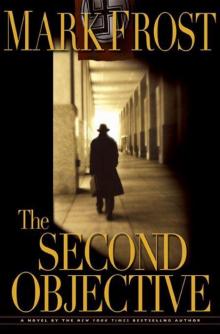 The Second Objective
The Second Objective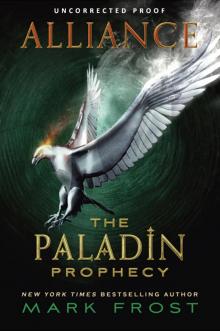 Alliance
Alliance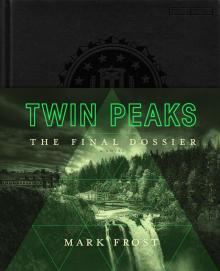 Twin Peaks: The Final Dossier
Twin Peaks: The Final Dossier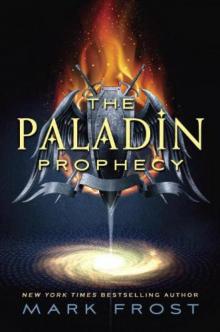 The Paladin Prophecy
The Paladin Prophecy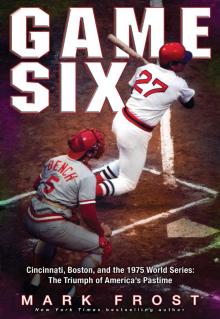 Game Six: Cincinnati, Boston, and the 1975 World Series: The Triumph of America's Pastime
Game Six: Cincinnati, Boston, and the 1975 World Series: The Triumph of America's Pastime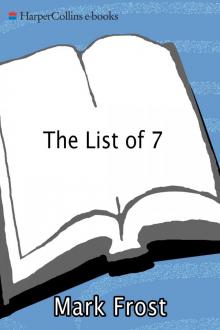 The List of Seven
The List of Seven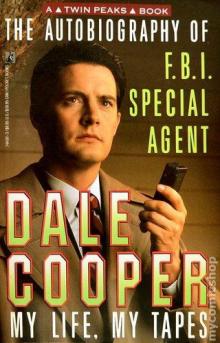 The Autobiography of FBI Special Agent Dale Cooper
The Autobiography of FBI Special Agent Dale Cooper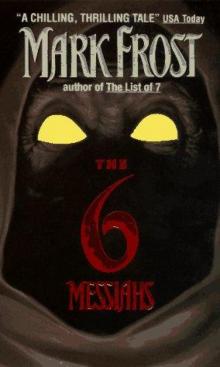 The Six Messiahs
The Six Messiahs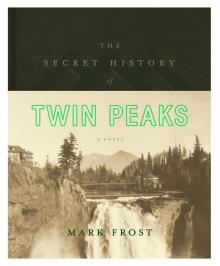 The Secret History of Twin Peaks
The Secret History of Twin Peaks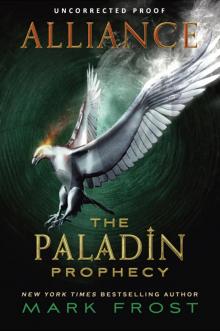 Paladin Prophecy 2: Alliance
Paladin Prophecy 2: Alliance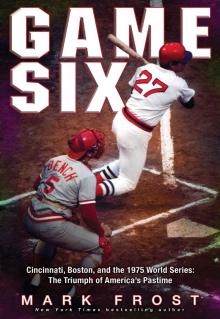 Game Six
Game Six